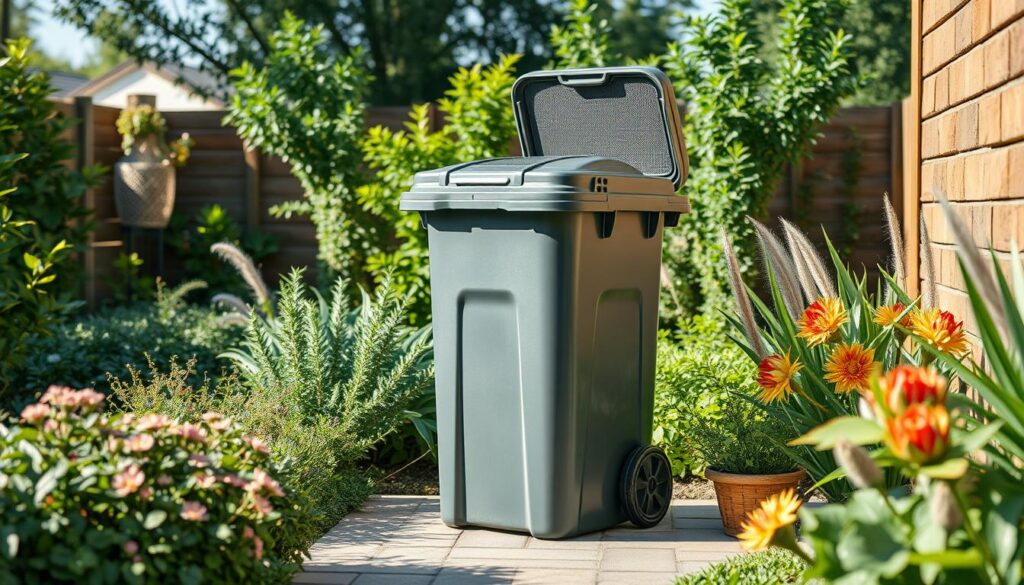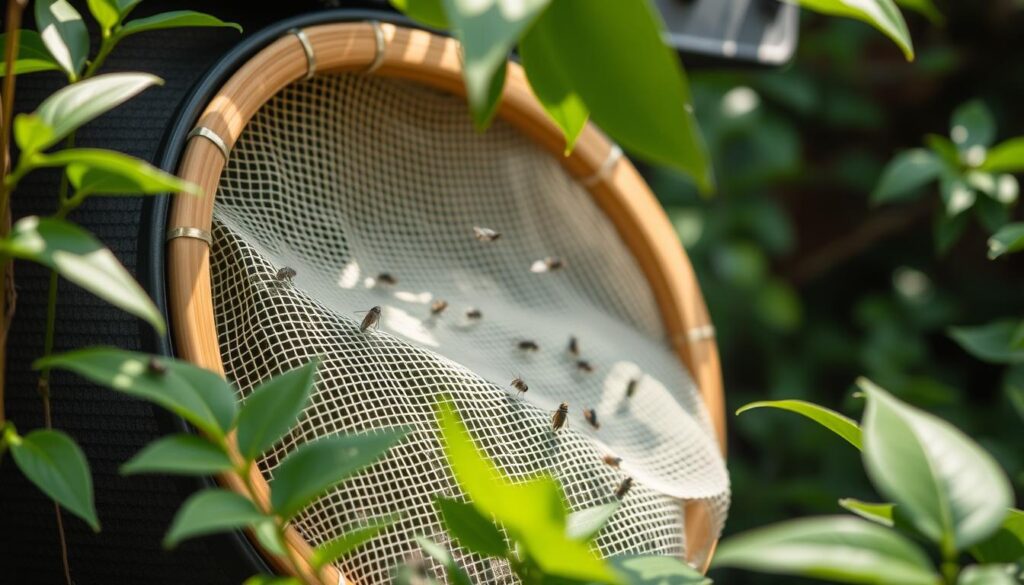Ever had flies buzzing around your outdoor bins? It’s annoying and can be unhealthy. But, you can stop flies from bothering you. Just turn your bin into a fly-proof one.
This way, you keep your bin clean and your space healthy. Ready to make your bin a fly-free zone?
Key Takeaways
- Transform your regular wheelie bin into a fly-proof container with ease.
- Keep pests at bay and maintain a cleaner, more hygienic outdoor space.
- Discover simple steps to seal your bin and prevent fly infestations.
- Explore effective deterrents and solutions to deter flies from accessing your bin contents.
- Learn how to maintain bin hygiene and reduce food waste to discourage fly activity.
Understanding the Problem with Flies and Bins
Flies are a big problem with wheelie bins. They are a nuisance for many homeowners in the UK. These insects love the smells and rotting stuff in bins. This makes bins a perfect place for them to breed.
Why Flies are Attracted to Bins
Flies like the smells of rotting food, meat waste, and pet waste in bins. When it’s warm, bins get even worse. This makes them a great place for flies to lay eggs and grow fast.
Common Fly Attractants Found in Bins
- Meat waste from cooking, such as leftover chicken or beef scraps
- Empty meat packets and other food packaging
- Soiled babies’ nappies
- Dog or cat food tins
These waste materials smell bad and attract flies. This can lead to more flies. It’s important to deal with these attractants to stop and manage the problem.
| Fly Attractant | Potential Risks |
|---|---|
| Rotting food | Spread of bacteria like Listeria, Salmonella, and E. coli |
| Meat waste | Increased risk of Hepatitis A and other foodborne illnesses |
| Pet food | Attracting rodents and other pests that can transmit diseases |
| Soiled nappies | Spread of bacterial and viral infections |
Knowing what attracts flies and the health risks helps. You can then take steps to stop and manage fly problems. This makes your home cleaner and safer.
Preventing Flies from Accessing Your Bin Contents
Keeping your kitchen bin fly-free is key to managing food waste. It also keeps your bin clean. To stop flies from getting into your bin, there are a few things you can do.
Avoid Putting Fly Attractants in Bins
Don’t put things like meat, fish, or nappies in your bin. These attract flies. Take them outside and throw them away right away to keep pests away.
Change Your Bins Regularly
Change your kitchen bins every day. This stops food waste from building up and flies from breeding. It also cuts down on bad smells and fly problems.
Use Bags Within Bags
Use a double-bagging method for waste that flies like. Put the waste in one bag, then in another. This keeps smells in and flies out.
By doing these simple things, you can stop flies from getting into your bin. Your home will be cleaner and healthier.

“Properly securing garbage bags can prevent flies from smelling and accessing rotting food, reducing the likelihood of infestations.”
| Measure | Benefit |
|---|---|
| Avoid putting fly attractants in bins | Reduces the presence of flies around your bin contents |
| Change your bins regularly | Helps limit the buildup of food waste and potential fly breeding grounds |
| Use bags within bags | Helps contain odours and restrict fly access to the contents |
By using these tips, you can keep flies out of your bin. Your home will be cleaner and healthier.
Sealing and Maintaining Your Outdoor Bins
Keeping outdoor bins clean is key to stop flies and keep waste areas tidy. Make sure the lid fits well and don’t fill bins too much. These steps are very important.
Ensuring a Tight Lid Seal
A tight lid keeps flies out of your bin. Check the seals often and change them if they’re damaged. This stops pests from getting in.
Avoiding Overfilling Bins
Don’t fill bins too full. It can break the seal and let flies in. Leave some room at the top for the lid to close well. This keeps flies out.
“Regularly cleaning the bin with a strong disinfectant can deter flies and maggots.”
Well-kept and sealed bins stop flies from getting in. This helps avoid infestations. A bit of effort now saves you trouble later.
Fly-proof wheelie bins: Effective Deterrents and Solutions
Struggling with flies around your outdoor wheelie bin? There are many ways to stop them. You can use insecticidal sprays or put up fly traps. These steps can help keep your bin clean and free from flies.
Using Insecticidal Sprays
Got a fly problem in your wheelie bin? Try an insecticidal spray to kill the flies. These sprays, like those with permethrin, work fast. But, be careful not to breathe in the spray and fix the problem’s cause too.
Installing Fly Traps
Or, put up fly traps, like UV light traps, near your bin. These traps catch or zap flies, offering a lasting fix. They’re great for places with lots of flies, helping lower their numbers.
But, don’t forget to solve the fly attractors too. Cut down food waste, store organic stuff right, and keep your bin clean. This way, you’ll keep flies away for good.
“Flies breed fast, with eggs turning into maggots in 24 hours. Maggots live about five to six days, then turn into pupae before becoming flies.”
By tackling fly prevention fully, you can have a cleaner, healthier area around your bin.

Natural Remedies for Deterring Flies
Flies can be a problem near your rubbish bins. But, you can use natural ways to keep them away. Herbs and essential oils can make your bin area less welcoming to flies without using harsh chemicals.
Using Herbs and Essential Oils
Put sprigs of herbs like elder, lavender, mint, or pennyroyal around your bin. These herbs smell bad to flies, keeping them away. You can also use essential oils like tea tree or citronella on the bin lid for a similar effect.
Freezing Pungent Food Waste
Freezing smelly food waste until collection day is another good idea. It stops the smell from attracting flies. This makes your bin less appealing to them.
Using these natural methods with good food waste management can help keep flies away. For example, using Lomi to turn food waste into soil is very effective.
“Freezing pungent food waste until collection day can also help prevent decomposition and reduce fly attractants.”
Maintaining Bin Hygiene and Cleanliness
Keeping your bins clean is very important. It stops flies and keeps waste management clean. Clean and disinfect bins inside and out often. This stops food scraps, grime, and smells that flies like.
Cleaning and Disinfecting Bins
Clean your bins often, especially when it’s warm. Use warm water and mild soap to clean inside and out. Don’t forget the lid and any small spaces where waste can hide. Disinfecting the bin with a suitable cleaning solution gets rid of bacteria and flies.
Reducing Food Waste
Less food waste means cleaner bins and fewer flies. Plan your meals, store food right, and compost. This makes your bin cleaner and helps the planet.
| Bin Cleaning Tips | Food Waste Reduction Strategies |
|---|---|
|
|
Keep your bins clean and hygienic. Regular cleaning and disinfection, and less food waste, make your bin less fly-friendly. This helps with waste management too.
“Proper waste management and hygiene practices are key to maintaining a fly-free bin environment.”
When to Seek Professional Pest Control Services
If DIY efforts don’t work against fly infestations, it’s time to call professionals. They offer effective solutions, especially in business settings. This is important to keep customers and staff safe.
UK pest control stats show some areas have more pests. Coastal areas have cockroaches, ants, and rodents. Forest areas have spiders, ticks, and mosquitoes. Wetlands are hotspots for mosquitoes, flies, and rodents.
Pests are attracted to food, water, and places to nest. If you see pests, droppings, or strange smells, act fast.
Businesses like schools and offices need pest control. Regular checks and treatments keep everyone safe. This stops disruptions and protects health.
For tough pest problems, get professional help. They find the cause, fix it, and help keep it away. This saves time and money.
“Investing in professional pest control services can save you time, money, and the hassle of dealing with escalating infestations. Their expertise and specialised solutions are often the best defence against persistent pest problems.”
Conclusion
Follow the steps in this guide to make your wheelie bin fly-proof. Stop flies by removing attractants and sealing bins. Use natural and chemical deterrents to keep them away.
Remember, if flies won’t go away, call a pest control service. They can help keep your outdoor space clean and free from pests.
Managing your bins well is key to a fly-free garden. Fix issues like food waste and bin cleanliness. Use barriers and repellents to keep pests out.
Being proactive with bin care and pest control saves time and money. Simple changes can make your garden fly-free and enjoyable.
